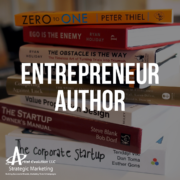Entrepreneurs Becoming Authors
Carpe diem – These are the words that an entrepreneur lives by. Door to door, state to state, country to country, entrepreneurs are willing to go anywhere and do anything if it means growing their business. But tell them they can grow their business by going into a dead quiet room, sitting down at a desk, and writing a book… suddenly they forget how to walk.
Ironically enough, writing a book is one of the most effective tools an entrepreneur can use. Not only can it grow your business, it can increase your credibility within an industry and set yourself apart from your competition. Yet, far too many entrepreneurs shy away from it.
Not all entrepreneurs, granted, should write a book (at least initially). Writing a book requires insight and expertise that can only come from years of experience – the longer one has been in a particular industry the more likely he or she is to have valuable information that other people want. So, to be more specific, writing a book is something that all established entrepreneurs should strongly consider.
There are many benefits to having your name on the front cover of a book. Credibility and visibility are two that you can reap regardless of how commercially successful your book is. Being able to append “author of…” to your list of accolades is valuable in and of itself because it affirms to consumers that you know enough about a subject to write a book about it; and when you are pit against competitors who haven’t written a book, you start off with a significant advantage.
If you are fortunate enough to have a commercially successful book, you open the door to even more possibilities. Not only does your credibility and visibility increase in proportion to your book’s success, because it is successful you will acquire a new secondary, passive form of income. And as the popularity of your book grows, so does your network of potential consumers and colleagues – this is because a book does more than give your name credibility, it begins to turn your very name into a brand so that anything your name is attached to instantly reaps the benefits of your credibility.
As your name increasingly gains brand value, because you’ve written a book you’ve also opened doors to even more opportunities for growing your business and spreading your ideas: Podcasts, speaking events, webinars… these are just a handful of ways in which your credibility as an author gives you leverage that you would’ve otherwise not had. Finding an opportunity to talk about your business on a podcast without having to do so in the form of an advertisement is almost impossible, but if you can tell podcasts that you have a book to talk about, they will be much more likely to pay attention.
You may be thinking, “This sounds great and all, but I don’t know the first thing about writing a book, let alone a successful one.” For a small percentage of people, this may be true. If you don’t have at least a decent command of the English language, writing a book may not be the best use of your time; but you don’t have to be the next Hemingway to write a good book, nor do you need to try to recall long-forgotten grammar rules in head-scratching vain – that’s what an editor is for. The only thing you have to focus on when writing a book is supplying the reader with as much valuable information as possible. If you write what you know, and know a lot, you can write a successful book.
An entrepreneur and an author may seem like two completely different personality types, but they have much more in common than meets the eye. Many of the approaches used to create a successful business also apply to creating a successful book. Door-to-door or page-to-page, in both cases the goal is the same: you have something other people want, and the only way to find out who those people are is to take action. Just look at The Artist Evolution CEO, Derek Champagne – an entrepreneur through and through, he took the challenge of writing a book, Don’t Buy a Duck, and before he knew it, he was a bestselling author on Amazon. Entrepreneurs don’t allow the fear of failure to stop them from starting a business, nor should it deter them from a writing a book – a book that could unlock opportunities that were previously inaccessible.





